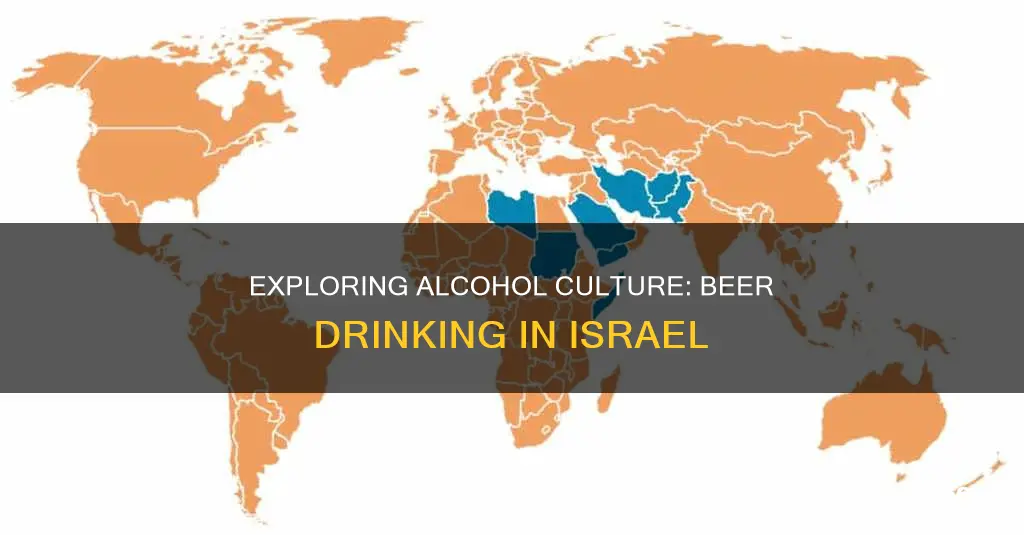
Israel is a country with a rich history and diverse religious and cultural traditions. When it comes to alcohol consumption, Israel has a unique landscape shaped by the interplay of ancient customs and modern influences. While the country generally adopts a relaxed attitude towards alcohol, with a legal drinking age of 18, there are nuances and considerations travellers should be aware of before indulging in a drink.
| Characteristics | Values |
|---|---|
| Legal drinking age | 18 |
| Availability of alcohol | Widely available in bars, restaurants, clubs, and grocery shops |
| Drinking in public | Allowed until 9 pm |
| Drinking laws | Proof of age is often requested at bars, nightclubs, and restaurants |
| Average cost of a large beer in a pub | $12 |
| Average cost of a can of beer in a supermarket | $3-4 |
What You'll Learn

The legal drinking age in Israel is 18 years old
Drinking alcohol is allowed in Israel, a country with a rich history, diverse religions, and unique customs and regulations. The legal drinking age in Israel is 18 years old. This means that those who are 18 or older can purchase alcohol from stores and consume it in public places, such as bars, restaurants, and clubs. It is important to always carry proof of age, as many places will request it.
Israel has a diverse range of alcoholic beverages, including locally produced wines, craft beers, and spirits. Wine has a long history in the country, dating back to biblical times, and regions like the Golan Heights, Galilee, and Judean Hills are known for their high-quality wines. Beer enthusiasts can explore the growing craft beer culture, with microbreweries offering a variety of styles and flavors. Additionally, spirits like Arak, an anise-flavored liquor, are popular and provide a taste of the regional culture.
While drinking alcohol is allowed in Israel, it is important to be mindful of religious considerations. Some areas, especially those with a significant Muslim population, may have stricter views on alcohol consumption. It is always respectful to adhere to local customs and practice responsible drinking. Moderation is essential, as excessive drinking in public places may be frowned upon.
In recent years, there has been a crackdown on nighttime drinking due to concerns about youth binge drinking. Legislation has been passed to ban the sale of alcohol outside of bars and restaurants between 11 p.m. and 6 a.m., and public alcohol consumption is also prohibited during these hours. This means that drinking in parks or on the streets after 9 p.m. is not allowed. As such, it is advisable to plan ahead and enjoy drinks responsibly within the permitted hours and designated areas.
Exploring Cairo's Beer Scene: What to Know Before Drinking
You may want to see also

Alcohol is forbidden in Arabic communities in Israel
Alcohol is forbidden and considered abhorrent by traditional followers of Islam and so is generally not available in Arabic communities inside Israel. This is because, according to Islamic tradition, alcohol consumption is banned.
In contrast, Jewish tradition accepts moderate alcohol use, and it is incorporated into religious ceremonies. However, inebriation is discouraged.
Arabic communities inside Israel refer to those in East Jerusalem, the Old City of Jerusalem, and the West Bank. These areas are largely Arabic societies, and women travelers, in particular, may be regarded with suspicion or provocation if they are unaccompanied by a man. As such, it is recommended that women visiting these areas are accompanied by at least one other person and dress and behave modestly.
While alcohol is generally unavailable in Arabic communities inside Israel, it may be accessible in hotels for tourists. It is also important to note that drinking or possessing alcohol in a transparent bottle on the streets of Israel is forbidden between the hours of 11 pm and 7 am. Additionally, drinking alcohol in a car in a public space is also illegal.
Beer Consultation: A Guide to the Process
You may want to see also

Drinking alcohol in public after 9 pm is prohibited
Drinking alcohol in public is prohibited in Israel after 9 pm. This means that if you are drinking in a public place, such as a park or on the street, you must finish before 9 pm. The law does not apply to drinking inside bars, restaurants, and clubs.
The law was passed in 2010 by the Knesset, which banned the sale and consumption of alcohol in public spaces between 11 pm and 6 am. This means that you cannot buy alcohol from a grocery store or kiosk after 11 pm, nor can you drink it in public during those hours. If you are caught by the police with an open container outside during these hours, they can pour out your drink.
This legislation was enacted due to rising youth binge drinking and changing attitudes towards nighttime drinking in Israel. While there is generally a relaxed attitude towards alcohol in the country, with bars staying open late and an accepted culture of drinking in public spaces, the new law aims to curb excessive drinking in public places.
It is important to note that the legal drinking age in Israel is 18 years old, and proof of age is often requested at bars, nightclubs, and restaurants, so carrying ID when going out is recommended. Additionally, alcohol is forbidden and considered abhorrent by traditional followers of Islam, so it is generally not available in Arabic communities inside Israel or in Jordan or the West Bank, except in tourist hotels.
Liver Biopsy: Drinking Beer, Safe or Not?
You may want to see also

Alcohol is expensive in Israel
The high taxation also discourages the growth of smaller microbreweries, as they are unable to take advantage of the benefits of scale that larger brewers can. Together, the two largest beer producers in Israel account for an estimated 95% of the market.
However, it is worth noting that alcohol prices can vary depending on the location within Israel. For example, beer prices in Sderot, a smaller city, would be far lower than in cosmopolitan Tel Aviv. Additionally, certain types of alcohol, such as Israeli wines, may be more affordable when purchased in shops or supermarkets rather than in hotels or restaurants.
Despite the high prices, Israel has a thriving nightlife, especially in cities like Tel Aviv, Eilat, Acre, and Jerusalem. The country also has a burgeoning bar culture, with a variety of specialty cocktails, craft beers, and prestigious winemakers. The legal drinking age in Israel is 18, and alcohol is not typically available in Arabic communities due to religious prohibitions.
The Science Behind Fizzics Beer: How Does It Work?
You may want to see also

Arak, an anise-flavoured spirit, is a popular drink in Israel
Arak is a traditional Middle Eastern spirit with a distinctive flavour. It is made from grapes, aniseed and other botanicals, and has been consumed in the Levant and Eastern Mediterranean for centuries. The drink is characterised by its strong aniseed or licorice flavour, with subtle citrus, herbal and even fruity notes. It is typically consumed as a digestif, or with chilled water and ice, which turns the clear liquid a milky-white colour.
Arak is a popular drink in Israel, where it is traditionally consumed in a social setting with friends and family. It is often served with mezze, such as hummus and falafel. In recent years, arak has seen a resurgence in popularity in Israel, with a growing number of boutique producers. It is now considered the chosen spirit of Israel's young generation and is also gaining traction among professionals, alcohol enthusiasts and the elite.
The alcohol content of arak is typically between 40-70% ABV, making it one of the strongest anise-flavoured spirits. When diluted with water, the ABV decreases significantly, so it is common for drinkers to add ice and water to reduce the strength of the beverage before consuming it.
Arak is produced by distilling grape brandy that has been flavoured with aniseed. The ratio of alcohol to aniseed can vary and is a key factor in determining the quality of the final product. The best arak is considered to be that which is distilled with good-quality anise, as this will turn the drink milky when mixed with water.
In Israel, arak is often consumed in shots or mixed drinks, but it is also enjoyed slowly sipped at room temperature or chilled. It is a versatile spirit that can be used in place of other spirits in classic cocktails, such as a Moscow Mule or a French Maid.
Beer and Bone Grafts: What You Need to Know
You may want to see also
Frequently asked questions
The legal drinking age in Israel is 18 years old.
Drinking in public is allowed in Israel, but there is a law that prohibits drinking alcohol on the streets after 9 pm.
Yes, you can drink alcohol in Jerusalem. While some parts of the city, such as the Muslim quarter, do not have bars, Western Jerusalem has plenty of pubs, bars, and restaurants serving alcohol.
Alcohol is easily available in Israel, and you can purchase it from grocery shops, bars, and restaurants. However, alcohol prices in Israel are very high compared to other countries.







